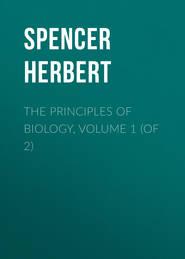По всем вопросам обращайтесь на: info@litportal.ru
(©) 2003-2024.
✖
First Principles
Настройки чтения
Размер шрифта
Высота строк
Поля
First Principles
Herbert Spencer
Herbert Spencer
First Principles
PREFACE
This volume is the first of a series described in a prospectus originally distributed in March, 1860. Of that prospectus, the annexed is a reprint.
A SYSTEM OF PHILOSOPHY
Mr. Herbert Spencer proposes to issue in periodical parts a connected series of works which he has for several years been preparing. Some conception of the general aim and scope of this series may be gathered from the following Programme.
FIRST PRINCIPLES
Part I. The Unknowable. – Carrying a step further the doctrine put into shape by Hamilton and Mansel; pointing out the various directions in which Science leads to the same conclusions; and showing that in this united belief in an Absolute that transcends not only human knowledge but human conception, lies the only possible reconciliation of Science and Religion.
Part II. Laws of the Knowable. – A statement of the ultimate principles discernible throughout all manifestations of the Absolute – those highest generalizations now being disclosed by Science which are severally true not of one class of phenomena but of all classes of phenomena; and which are thus the keys to all classes of phenomena.[1 - One of these generalizations is that currently known as “the Conservation of Force;” a second may be gathered from a published essay on “Progress: its Law and Cause;” a third is indicated in a paper on “Transcendental Physiology;” and there are several others.]
[In logical order should here come the application of these First Principles to Inorganic Nature. But this great division it is proposed to pass over: partly because, even without it, the scheme is too extensive; and partly because the interpretation of Organic Nature after the proposed method, is of more immediate importance. The second work of the series will therefore be– ]
THE PRINCIPLES OF BIOLOGY
Vol. I
Part I. The Data of Biology. – Including those general truths of Physics and Chemistry with which rational Biology must set out.
II. The Inductions of Biology. – A statement of the leading generalizations which Naturalists, Physiologists, and Comparative Anatomists, have established.
III. The Evolution of Life. – Concerning the speculation commonly known as “The Development Hypothesis” – its à priori and à posteriori evidences.
Vol. II
IV. Morphological Development. – Pointing out the relations that are everywhere traceable between organic forms and the average of the various forces to which they are subject; and seeking in the cumulative effects of such forces a theory of the forms.
V. Physiological Development. – The progressive differentiation of functions similarly traced; and similarly interpreted as consequent upon the exposure of different parts of organisms to different sets of conditions.
VI. The Laws of Multiplication. – Generalizations respecting the rates of reproduction of the various classes of plants and animals; followed by an attempt to show the dependence of these variations upon certain necessary causes.[2 - The ideas to be developed in the second volume of the Principles of Biology the writer has already briefly expressed in sundry Review-Articles. Part IV. will work out a doctrine suggested in a paper on “The Laws of Organic Form,” published in the Medico-Chirurgical Review for January, 1859. The germ of Part V. is contained in the essay on “Transcendental Physiology:” See Essays, pp. 280–90. And in Part VI. will be unfolded certain views crudely expressed in a “Theory of Population,” published in the Westminster Review for April, 1852.]
THE PRINCIPLES OF PSYCHOLOGY
Vol. I
Part I. The Data of Psychology. – Treating of the general connexions of Mind and Life and their relations to other modes of the Unknowable.
II. The Inductions of Psychology. – A digest of such generalizations respecting mental phenomena as have already been empirically established.
III. General Synthesis. – A republication, with additional chapters, of the same part in the already-published The Principles of Psychology.
IV. Special Synthesis. – A republication, with extensive revisions and additions, of the same part, &c. &c.
V. Physical Synthesis. – An attempt to show the manner in which the succession of states of consciousness conforms to a certain fundamental law of nervous action that follows from the First Principles laid down at the outset.
Vol. II
VI. Special Analysis. – As at present published, but further elaborated by some additional chapters.
VII. General Analysis. – As at present published, with several explanations and additions.
VIII. Corollaries. – Consisting in part of a number of derivative principles which form a necessary introduction to Sociology.[3 - Respecting the several additions to be made to the Principles of Psychology, it seems needful only to say that Part V. is the unwritten division named in the preface to that work – a division of which the germ is contained in a note on page 544, and of which the scope has since been more definitely stated in a paper in the Medico-Chirurgical Review for Jan. 1859.]
THE PRINCIPLES OF SOCIOLOGY
Vol. I
Part I. The Data of Sociology. – A statement of the several sets of factors entering into social phenomena – human ideas and feelings considered in their necessary order of evolution; surrounding natural conditions; and those ever complicating conditions to which Society itself gives origin.
II. The Inductions of Sociology. – General facts, structural and functional, as gathered from a survey of Societies and their changes: in other words, the empirical generalizations that are arrived at by comparing different societies, and successive phases of the same society.
III. Political Organization. – The evolution of governments, general and local, as determined by natural causes; their several types and metamorphoses; their increasing complexity and specialization; and the progressive limitation of their functions.
Vol. II
IV. Ecclesiastical Organization. – Tracing the differentiation of religious government from secular; its successive complications and the multiplication of sects; the growth and continued modification of religious ideas, as caused by advancing knowledge and changing moral character; and the gradual reconciliation of these ideas with the truths of abstract science.
V. Ceremonial Organization. – The natural history of that third kind of government which, having a common root with the others, and slowly becoming separate from and supplementary to them, serves to regulate the minor actions of life.
VI. Industrial Organization. – The development of productive and distributive agencies, considered, like the foregoing, in its necessary causes: comprehending not only the progressive division of labour, and the increasing complexity of each industrial agency, but also the successive forms of industrial government as passing through like phases with political government.
Vol. III
VII. Lingual Progress. – The evolution of Languages regarded as a psychological process determined by social conditions.
VIII. Intellectual Progress. – Treated from the same point of view: including the growth of classifications; the evolution of science out of common knowledge; the advance from qualitative to quantitative prevision, from the indefinite to the definite, and from the concrete to the abstract.
IX. Æsthetic Progress. – The Fine Arts similarly dealt with: tracing their gradual differentiation from primitive institutions and from each other; their increasing varieties of development; and their advance in reality of expression and superiority of aim.
X. Moral Progress. – Exhibiting the genesis of the slow emotional modifications which human nature undergoes in its adaptation to the social state.
XI. The Consensus. – Treating of the necessary interdependence of structures and of functions in each type of society, and in the successive phases of social development.[4 - Of this treatise on Sociology a few small fragments may be found in already-published essays. Some of the ideas to be developed in Part II. are indicated in an article on “The Social Organism,” contained in the last number of the Westminster Review; those which Part V. will work out, may be gathered from the first half of a paper written some years since on “Manners and Fashion;” of Part VIII. the germs are contained in an article on the “Genesis of Science;” two papers on “The Origin and Function of Music” and “The Philosophy of Style,” contain some ideas to be embodied in Part IX.; and from a criticism of Mr. Bain’s work on “The Emotions and the Will,” in the last number of the Medico-Chirurgical Review, the central idea to be developed in Part X. may be inferred.]
THE PRINCIPLES OF MORALITY
Vol. I
Part I. The Data of Morality. – Generalizations furnished by Biology, Psychology and Sociology, which underlie a true theory of right living: in other words, the elements of that equilibrium between constitution and conditions of existence, which is at once the moral ideal and the limit towards which we are progressing.
II. The Inductions of Morality. – Those empirically-established rules of human action which are registered as essential laws by all civilized nations: that is to say – the generalizations of expediency.
Herbert Spencer
Herbert Spencer
First Principles
PREFACE
This volume is the first of a series described in a prospectus originally distributed in March, 1860. Of that prospectus, the annexed is a reprint.
A SYSTEM OF PHILOSOPHY
Mr. Herbert Spencer proposes to issue in periodical parts a connected series of works which he has for several years been preparing. Some conception of the general aim and scope of this series may be gathered from the following Programme.
FIRST PRINCIPLES
Part I. The Unknowable. – Carrying a step further the doctrine put into shape by Hamilton and Mansel; pointing out the various directions in which Science leads to the same conclusions; and showing that in this united belief in an Absolute that transcends not only human knowledge but human conception, lies the only possible reconciliation of Science and Religion.
Part II. Laws of the Knowable. – A statement of the ultimate principles discernible throughout all manifestations of the Absolute – those highest generalizations now being disclosed by Science which are severally true not of one class of phenomena but of all classes of phenomena; and which are thus the keys to all classes of phenomena.[1 - One of these generalizations is that currently known as “the Conservation of Force;” a second may be gathered from a published essay on “Progress: its Law and Cause;” a third is indicated in a paper on “Transcendental Physiology;” and there are several others.]
[In logical order should here come the application of these First Principles to Inorganic Nature. But this great division it is proposed to pass over: partly because, even without it, the scheme is too extensive; and partly because the interpretation of Organic Nature after the proposed method, is of more immediate importance. The second work of the series will therefore be– ]
THE PRINCIPLES OF BIOLOGY
Vol. I
Part I. The Data of Biology. – Including those general truths of Physics and Chemistry with which rational Biology must set out.
II. The Inductions of Biology. – A statement of the leading generalizations which Naturalists, Physiologists, and Comparative Anatomists, have established.
III. The Evolution of Life. – Concerning the speculation commonly known as “The Development Hypothesis” – its à priori and à posteriori evidences.
Vol. II
IV. Morphological Development. – Pointing out the relations that are everywhere traceable between organic forms and the average of the various forces to which they are subject; and seeking in the cumulative effects of such forces a theory of the forms.
V. Physiological Development. – The progressive differentiation of functions similarly traced; and similarly interpreted as consequent upon the exposure of different parts of organisms to different sets of conditions.
VI. The Laws of Multiplication. – Generalizations respecting the rates of reproduction of the various classes of plants and animals; followed by an attempt to show the dependence of these variations upon certain necessary causes.[2 - The ideas to be developed in the second volume of the Principles of Biology the writer has already briefly expressed in sundry Review-Articles. Part IV. will work out a doctrine suggested in a paper on “The Laws of Organic Form,” published in the Medico-Chirurgical Review for January, 1859. The germ of Part V. is contained in the essay on “Transcendental Physiology:” See Essays, pp. 280–90. And in Part VI. will be unfolded certain views crudely expressed in a “Theory of Population,” published in the Westminster Review for April, 1852.]
THE PRINCIPLES OF PSYCHOLOGY
Vol. I
Part I. The Data of Psychology. – Treating of the general connexions of Mind and Life and their relations to other modes of the Unknowable.
II. The Inductions of Psychology. – A digest of such generalizations respecting mental phenomena as have already been empirically established.
III. General Synthesis. – A republication, with additional chapters, of the same part in the already-published The Principles of Psychology.
IV. Special Synthesis. – A republication, with extensive revisions and additions, of the same part, &c. &c.
V. Physical Synthesis. – An attempt to show the manner in which the succession of states of consciousness conforms to a certain fundamental law of nervous action that follows from the First Principles laid down at the outset.
Vol. II
VI. Special Analysis. – As at present published, but further elaborated by some additional chapters.
VII. General Analysis. – As at present published, with several explanations and additions.
VIII. Corollaries. – Consisting in part of a number of derivative principles which form a necessary introduction to Sociology.[3 - Respecting the several additions to be made to the Principles of Psychology, it seems needful only to say that Part V. is the unwritten division named in the preface to that work – a division of which the germ is contained in a note on page 544, and of which the scope has since been more definitely stated in a paper in the Medico-Chirurgical Review for Jan. 1859.]
THE PRINCIPLES OF SOCIOLOGY
Vol. I
Part I. The Data of Sociology. – A statement of the several sets of factors entering into social phenomena – human ideas and feelings considered in their necessary order of evolution; surrounding natural conditions; and those ever complicating conditions to which Society itself gives origin.
II. The Inductions of Sociology. – General facts, structural and functional, as gathered from a survey of Societies and their changes: in other words, the empirical generalizations that are arrived at by comparing different societies, and successive phases of the same society.
III. Political Organization. – The evolution of governments, general and local, as determined by natural causes; their several types and metamorphoses; their increasing complexity and specialization; and the progressive limitation of their functions.
Vol. II
IV. Ecclesiastical Organization. – Tracing the differentiation of religious government from secular; its successive complications and the multiplication of sects; the growth and continued modification of religious ideas, as caused by advancing knowledge and changing moral character; and the gradual reconciliation of these ideas with the truths of abstract science.
V. Ceremonial Organization. – The natural history of that third kind of government which, having a common root with the others, and slowly becoming separate from and supplementary to them, serves to regulate the minor actions of life.
VI. Industrial Organization. – The development of productive and distributive agencies, considered, like the foregoing, in its necessary causes: comprehending not only the progressive division of labour, and the increasing complexity of each industrial agency, but also the successive forms of industrial government as passing through like phases with political government.
Vol. III
VII. Lingual Progress. – The evolution of Languages regarded as a psychological process determined by social conditions.
VIII. Intellectual Progress. – Treated from the same point of view: including the growth of classifications; the evolution of science out of common knowledge; the advance from qualitative to quantitative prevision, from the indefinite to the definite, and from the concrete to the abstract.
IX. Æsthetic Progress. – The Fine Arts similarly dealt with: tracing their gradual differentiation from primitive institutions and from each other; their increasing varieties of development; and their advance in reality of expression and superiority of aim.
X. Moral Progress. – Exhibiting the genesis of the slow emotional modifications which human nature undergoes in its adaptation to the social state.
XI. The Consensus. – Treating of the necessary interdependence of structures and of functions in each type of society, and in the successive phases of social development.[4 - Of this treatise on Sociology a few small fragments may be found in already-published essays. Some of the ideas to be developed in Part II. are indicated in an article on “The Social Organism,” contained in the last number of the Westminster Review; those which Part V. will work out, may be gathered from the first half of a paper written some years since on “Manners and Fashion;” of Part VIII. the germs are contained in an article on the “Genesis of Science;” two papers on “The Origin and Function of Music” and “The Philosophy of Style,” contain some ideas to be embodied in Part IX.; and from a criticism of Mr. Bain’s work on “The Emotions and the Will,” in the last number of the Medico-Chirurgical Review, the central idea to be developed in Part X. may be inferred.]
THE PRINCIPLES OF MORALITY
Vol. I
Part I. The Data of Morality. – Generalizations furnished by Biology, Psychology and Sociology, which underlie a true theory of right living: in other words, the elements of that equilibrium between constitution and conditions of existence, which is at once the moral ideal and the limit towards which we are progressing.
II. The Inductions of Morality. – Those empirically-established rules of human action which are registered as essential laws by all civilized nations: that is to say – the generalizations of expediency.











